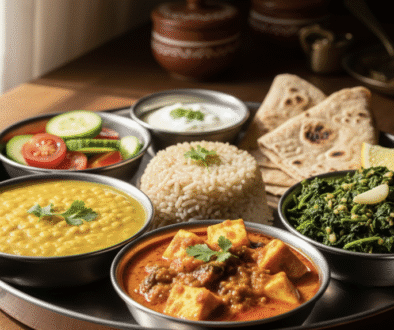Why Vitamin B12 is Essential for Vegetarians & How to Get Enough
If you follow a vegetarian diet, you probably get asked a lot of questions. Where do you get your protein? Aren’t you low on iron? But there’s one nutrient that doesn’t get enough attention – Vitamin B12. Vitamin B12 might sound like just another vitamin on a long list, but this one’s a little different. It’s like the behind-the-scenes worker that keeps your energy levels up, your nerves healthy, and even your memory sharp. The tricky part? It’s not easy to find Vitamin B12 foods for vegetarians.
Why is Vitamin B12 So Important?
Let’s start with the basics. Your body needs Vitamin B12 for several jobs:
- It helps make red blood cells. Without enough B12, your body struggles to carry oxygen properly, leaving you tired and weak.
- It’s crucial for nerve health. Ever felt pins and needles in your hands or feet? That could be a sign of low B12.
- It supports your brain. Some studies link low B12 with memory problems and even mood swings.
But here’s the twist – most B12 rich foods for vegetarians are not actually plants. They come from animal-based foods. That’s why vegetarians need to plan carefully to get enough.
Why Vegetarians Are at Risk of Vitamin B12 Deficiency
The most natural sources of Vitamin B12 are found in meat, fish, and seafood. If you’re vegetarian, those are off the menu. So where does that leave you? The truth is, unless you’re eating B12 rich foods for vegetarians on purpose, your levels could dip over time. And B12 deficiency doesn’t show up overnight. It creeps up slowly, starting with tiredness or foggy thinking.
I once met a fellow vegetarian at a health retreat. She told me how she was always exhausted, even though she slept eight hours a night. Doctors kept saying her bloodwork was fine; until someone checked her B12. It was way too low. That’s when she realized she hadn’t eaten any Vitamin B12 foods for vegetarians in years.
How Much Vitamin B12 Do You Actually Need?
The recommended daily intake for adults is about 2.4 micrograms. That’s a tiny amount; but don’t let that fool you. It’s like oil in a car engine: a little goes a long way, but without it, everything breaks down.
For vegetarians, getting this amount means being intentional. No more hoping your spinach salad has some magical B12 hidden inside; because it doesn’t.
The Best Vegetarian Sources of B12
Let’s get practical. What should you actually eat to hit your B12 target? Here’s a list of the best vegetarian sources of B12 that can fit into your daily meals.
- Dairy Products (Milk, Yogurt, Cheese)
Dairy is one of the most reliable sources of B12 for vegetarians. A glass of milk or a bowl of yogurt can give you a small B12 boost. Cheese (especially Swiss cheese) also carries a decent dose.
- Eggs
Eggs, especially the yolk, contain Vitamin B12. If you love making omelets or boiled eggs for breakfast, you’re already on the right track.
- Fortified Cereals
Not all cereals are created equal. Some brands fortify their cereals with B12, especially the ones marketed as healthy or for vegetarians. Read labels carefully to find these.
- Nutritional Yeast
This golden, cheesy-tasting powder is a vegetarian favorite. Many brands fortify nutritional yeast with B12, making it a superstar for plant-based eaters.
- Fortified Plant Milks
Soy milk, almond milk, oat milk; many are fortified with B12 these days. If you prefer plant-based milk, make sure it’s fortified and shake the carton well before pouring (B12 tends to settle at the bottom).
Symptoms of B12 Deficiency You Shouldn’t Ignore
Let me paint you a picture. Imagine waking up after a full night’s sleep, but still feeling drained. Your brain feels foggy, and you keep forgetting little things; like why you walked into the kitchen.
That’s how B12 deficiency often starts. Other warning signs include:
- Tingling in hands and feet
- Pale or yellowish skin
- Mood swings or depression
- Muscle weakness
- Shortness of breath
If any of this sounds familiar, it’s time to look at your diet and ask: Am I eating enough Vitamin B12 foods for vegetarians?
Should You Take a Supplement?
Food is always the best first choice; but for some vegetarians, it’s just not enough. If you avoid dairy and eggs (or your digestion isn’t great), a B12 supplement can be a smart safety net. There are B12 sprays, tablets, lozenges, and even drops. Methylcobalamin is one of the more absorbable forms. If you’re not sure, talk to a nutritionist who understands vegetarian diets.
Final Thoughts
Being vegetarian is a wonderful lifestyle; but like any lifestyle, it takes knowledge and planning. If you want to thrive (not just survive), keeping your B12 levels healthy is non-negotiable.
Next time someone asks you, Are vegetarians low in B12? you’ll have a confident answer; and a fridge full of B12 rich foods for vegetarians to back you up.




10 Best Vegetarian Foods for Heart Health
August 12, 2025 @ 5:54 am
[…] food is your favourite? Let us know in the comments. If you enjoy this blog, read about Why Vitamin B12 is Essential for Vegetarians & How to Get Enough […]